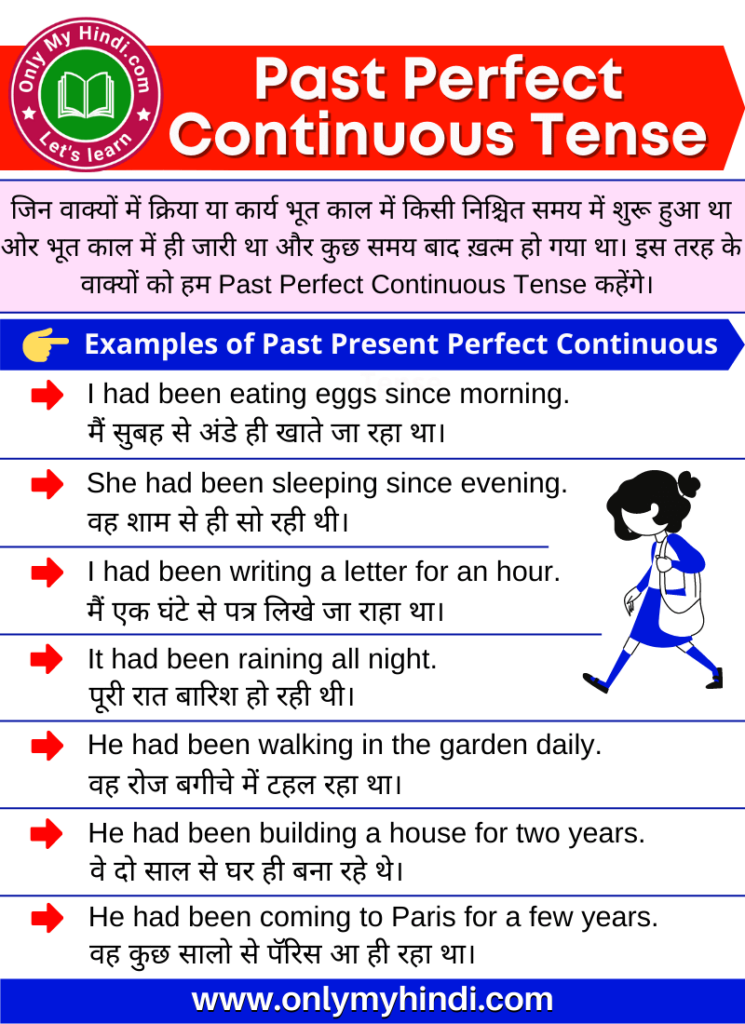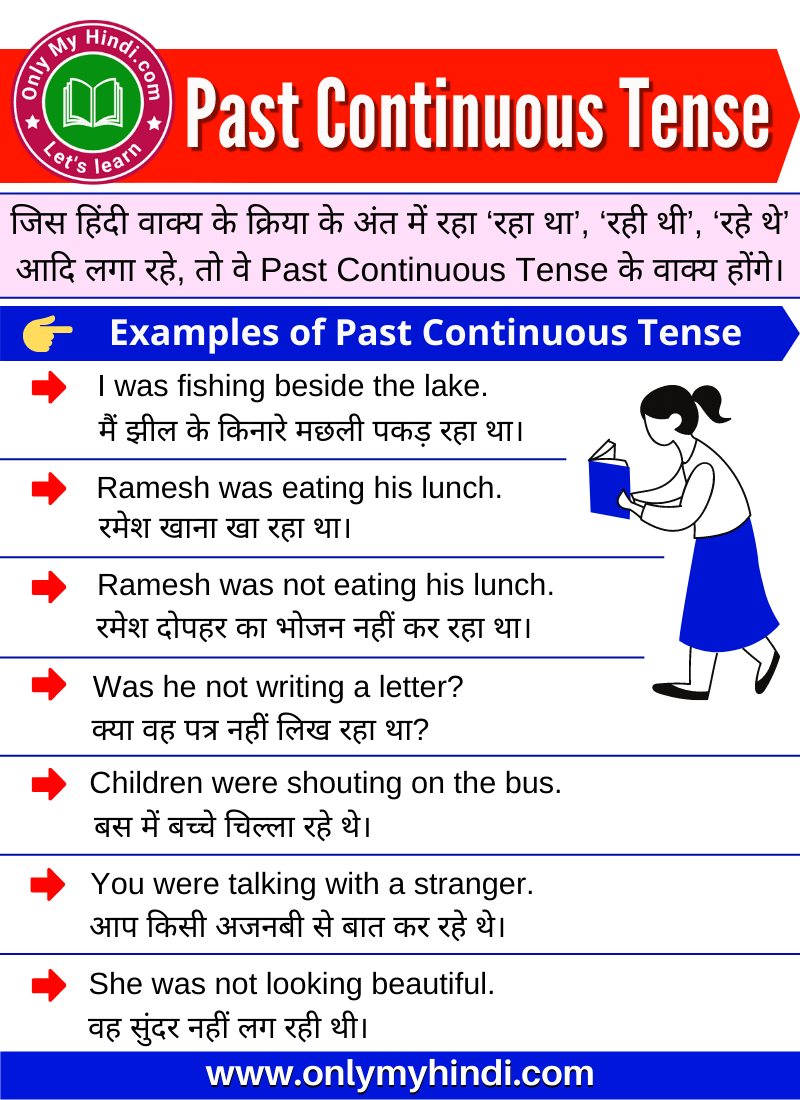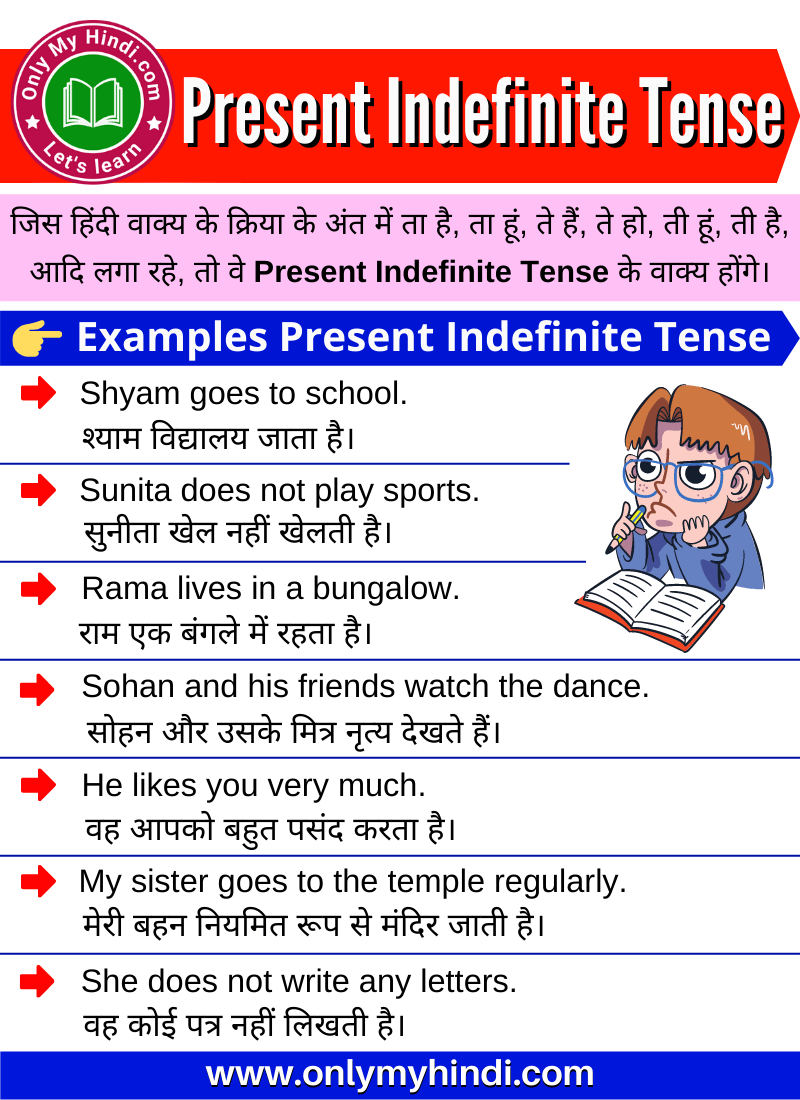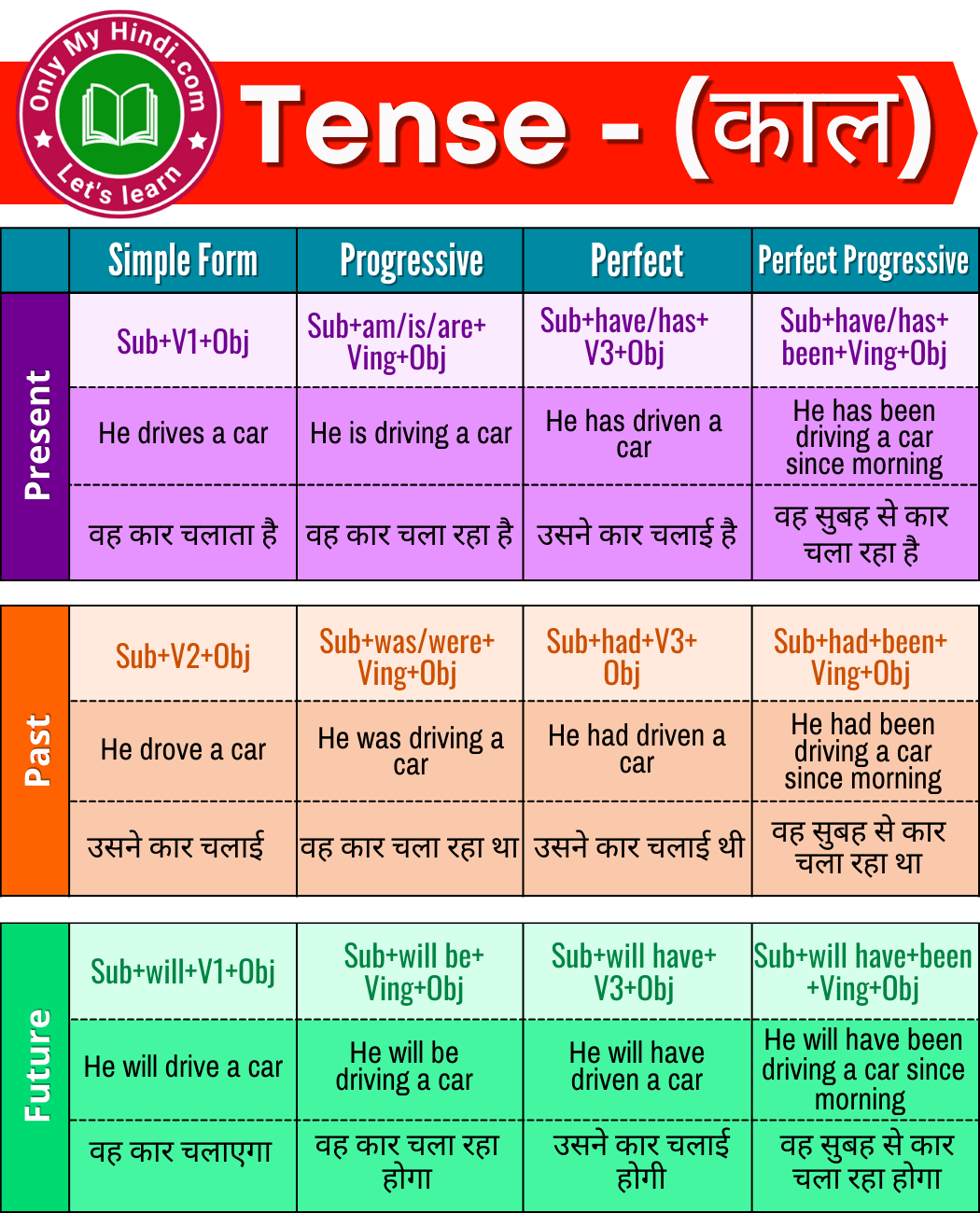क्या आप ढूंढ रहे हैं Past Perfect Continuous Tense in Hindi with Rules, Exercise and Examples? यहां पर हमने आपको सरल भाषा में समझाया है की Past Perfect Continuous क्या होता है, और हम इसे किस तरह से इस्तेमाल कर सकते है।
Past Perfect Continuous Tense in Hindi
‘Past Perfect Continuous Tense’ को हम हिंदी में ‘पूर्ण-अपूर्ण भूत काल’ कहते हैं या फिर ‘भूत पूर्ण-निरंतर काल’ भी कहते हैं।
इस Tense में उपयोग होने वाले वाक्यों से हमें पता चलता है की कोई कार्य भूत काल में किसी निश्चित समय में शुरू हुआ था ओर भूत काल में ही जारी था और कुछ समय बाद ख़त्म हो गया था। इस tense के वाक्यों में हमें कार्य के भूत काल में शुरू होने का समय तथा वह कार्य जारी था या ख़त्म हो चूका था इसका पता चलता है।
Past Perfect Continuous Tense की पहचान
Past Perfect Continuous Tense ‘पूर्ण-अपूर्ण भूतकाल’ को हम किस तरह पहचान सकते हैं?
Past Perfect Continuous Tense के वाक्यों को पहचानना बड़ा ही सरल है। इन वाक्यों में क्रिया या कार्य के शुरू होने का समय दिया गया हो और इनके अंत में ‘रहा था’, ‘रही थी’, ‘रहे थे’ आदि शब्द आते है। अगर हम इन वाक्यों में से समय को हटा दें, तो यह वाक्य Past Continuous Tense ‘अपूर्ण भूतकाल’ जैसे भी उपयोग कर सकते है।
Past Perfect Continuous Tense के अंग्रेजी वाक्यों में helping verb ‘had + been’ का उपयोग होता है और इसके साथ में verb का fourth form हो जो कार्य के भूतकाल के किसी स्थिति में शुरू हुआ था और कुछ समय तक जारी रह कर ख़त्म हो चूका है।
Formula: Subject + had + been + verb (ing) + Object.
Past Perfect Continuous Tense Examples in Hindi
- I had been eating eggs since morning.
मैं सुबह से अंडे ही खाते जा रहा था।
- She had been sleeping since evening.
वह शाम से ही सो रही थी।
- I had been writing a letter for an hour.
मैं एक घंटे से पत्र लिख रहा था।
- It had been raining all night.
पूरी रात बारिश हो रही थी।
- He had been walking in the garden daily.
वह रोज बगीचे में टहल रहा था।

Types of Past Perfect Continuous Tense in Hindi
Past Perfect Continuous Tense के वाक्यों के कुल तीन प्रकार होते हैं।
- Affirmative sentence (सकारात्मक वाक्य)
- Negative sentence (नकारात्मक वाक्य)
- Interrogative sentence (प्रश्नवाचक वाक्य)
Affirmative Sentence
‘Affirmative sentence’ of Past Perfect Continuous tense पूर्ण-अपूर्ण भूतकाल के सामान्य सकारात्मक वाक्य है जो किसी वाक्य में हो रहे या हो चुके कार्य के सकारात्मकता को दर्शाते हैं।
Affirmative sentence की रचना:
Formula: Subject + had + been + verb (ing) + Object.
Examples,
- We had been sitting at this place for three hours.
हम इस जगह पर 3 घंटे से बैठ रहे थे।
- We had been going together for a long time.
हम लंबे समय से साथ चले जा रहे थे।
- She had been singing a song since thirty minutes.
वह 30 मिनट से एक गाना गा रही थी ।
- He had been trying to get up since morning.
वह सुबह से उठने की कोशिश कर रहा था।
- We had been working on that topic for two hours only.
हम उस विषय पर 2 घंटे से काम कर ही रहे थे।
Negative Sentence
‘Negative sentence’ of Past Perfect Continuous tense पूर्ण-अपूर्ण भूतकाल के सामान्य नकारात्मक वाक्य है जो किसी वाक्यों के व्यक्त किये गए कार्यों को नकारात्मक तरीके से दर्शाते हैं।
इन वाक्यों में जो helping verb है उनके साथ not का इस्तेमाल होता है जो नकारात्मकता को दर्शाता हैं।
Negative sentence की रचना:
Formula: Subject + had + not + been + verb (ing) + Object.
Examples,
- We had not been sitting at this place for three hours.
हम इस जगह पर 3 घंटे से नहीं बैठ रहे थे।
- We had not been going together for a long time.
हम लंबे समय से एक साथ नहीं जा रहे थे।
- She had not been singing a song for thirty minutes.
वह 30 मिनट से गाना नहीं गा रही थी।
- He had not been trying to get up since morning.
वह सुबह से उठने की कोशिश नहीं कर रहा था।
- We had not been working on this topic for two hours.
हम 2 घंटे से इस विषय पर काम नहीं कर रहे थे।
Interrogative Sentence
‘Interrogative sentence’ of Past Perfect Continuous tense पूर्ण-अपूर्ण भूतकाल के सामान्य प्रश्नात्मक वाक्य है जो किसी वाक्यों के व्यक्त किये गए कार्यों को प्रश्नात्मक तरीके से व्यक्त करते हैं।
प्रश्नात्मक वाक्य helping verbs से शुरू होता है और अंत में Question mark से ख़त्म होता है जो प्रश्नात्मकता को दर्शाता है।
Interrogative sentence की रचना:
Formula: Had + Subject + been + verb (ing) + Object?
Wh type + had + Subject + been + verb (ing) + Object?
Had + Subject + not + been + verb (ing) + Object?
Wh type + had + Subject + not + been + verb (ing) + Object?
Examples,
- Had he been sitting at this place for three hours?
क्या वह इस जगह पर 3 घंटे से बैठा था?
- Had they been going together for a long time?
क्या वे लंबे समय से एक साथ जा रहे थे?
- What had she been singing for thirty minutes?
वह 30 मिनट से क्या गा रही थी?
- Had he been trying to get up since this morning?
क्या वह आज सुबह से उठने की कोशिश कर रहा था?
- Why were you guys working on the same topic for two hours?
आप लोग एक ही विषय पर 2 घंटे तक काम क्यों कर रहे थे?
- Had he not been sitting at this place for three hours?
क्या वह इस स्थान पर 3 घंटे से नहीं बैठा था?
- Had we not been together for a long time?
क्या हम लंबे समय से साथ नहीं थे?
- What had she not been singing for thirty minutes?
वह 30 मिनट से क्या नहीं गा रही थी?
- Had he not been trying to get up since this morning?
क्या वह आज सुबह से उठने की कोशिश नहीं कर रहा था?
- Why had we not been working on this topic for two hours?
हम इस विषय पर 2 घंटे से काम क्यों नहीं कर रहे थे?
Past Perfect Continuous Tense Sentences in Hindi
For Affirmative sentences,
- He had been building a house for two years.
वे 2 साल से घर ही बना रहे थे।
- Sheetal had been going to school since Monday.
शीतल सोमवार से ही स्कूल जा रही थी।
- Zoya had been learning karate since childhood.
ज़ोया बचपन से कराटे सीख ही रही थी।
- She had been washing her clothes since 1990.
वह 1990 से अपने कपड़े खुद ही धो रही थी।
- I had been completing my assignment for four days.
मैं चार दिनों से अपना असाइनमेंट पूरा कर रहा था।
- He had been coming to Paris for a few weeks.
वह कुछ हफ़्तों के लिए पॅरिस आ ही रहा था।
- From noon onwards, they had been celebrating their victory.
दोपहर से ही वे अपनी जीत का जश्न मनाते जा रहे थे।
- Aditya had been trying to talk to her for a few days.
आदित्य कुछ दिनों से उससे बात करने की कोशिश कर ही रहा था।
- He had been listening to his teacher for the last two hours.
वह पिछले 2 घंटे से अपने शिक्षक की बात सुन ही रहा था।
- Raghav had been fighting for this opportunity for so long.
राघव इतने लंबे समय से इस मौके के लिए संघर्ष करते जा रहे थे।
For Negative sentences,
- He had not been building a house for two years.
वह 2 साल से घर नहीं बना रहा था।
- Sheetal had not been going to school since Monday.
शीतल सोमवार से स्कूल नहीं जा रही थी।
- Zoya had not been learning karate since childhood.
ज़ोया बचपन से कराटे नहीं सीख रही थी।
- She had not been washing her clothes since 1990.
वह 1990 से अपने कपड़े खुद नहीं धो रही थी।
- I had not been completing my assignment for four days.
मैं चार दिनों से ही अपना असाइनमेंट पूरा नहीं कर रहा था।
- He had not been coming to Paris for a few weeks.
वह कुछ हफ्तों से पॅरिस नहीं आ रहा था।
- From noon onwards, they had not been celebrating their victory.
दोपहर के बाद से वे अपनी जीत का जश्न नहीं मना रहे थे।
- Aditya had not been trying to talk to her for a few days.
आदित्य कुछ दिनों से उससे बात करने की कोशिश नहीं कर रहा था।
- He had not been listening to his teacher for the last two hours.
वह पिछले 2 घंटे से अपने शिक्षक की बात नहीं सुनते जा रहा था।
- Raghav had not been fighting for this opportunity for so long.
राघव इतने लंबे समय से इस अवसर के लिए नहीं लड़ते जा रहा थे।
For Interrogative sentences,
- (Interrogative Affirmative sentences)
- Had they been building a house for two years?
क्या वे 2 साल से घर बनाते जा रहे थे?
- Where had Sheetal been going since Monday?
सोमवार से शीतल कहाँ जाते जा रही थी?
- Where had Zoya been going to learn karate since childhood?
ज़ोया बचपन से कराटे कहाँ सीखते जा रही थी?
- Had she been washing her clothes since 1990?
क्या वह 1990 से अपने कपड़े खुद धो रही थी?
- Had I been completing my work for four days?
क्या मैं अपना कार्य चार दिनों से पूरा कर रहा था?
- How had he been coming to Paris for a few weeks?
वह कुछ हफ़्तों से पॅरिस कैसे आ रहा था?
- Why had they been celebrating their victory since noon?
वे दोपहर से अपनी जीत का जश्न क्यों मानते जा रहे थे?
- What had Aditya been trying to talk to her for a few days?
आदित्य कुछ दिनों से ही उससे क्या बात करने की कोशिश कर रहा था?
- What had he been listening to for the last two hours?
वह पिछले 2 घंटे से क्या सुनते जा रहा था?
- Had Raghav been fighting for this opportunity for so long?
क्या राघव इतने लंबे समय से इस मौके के लिए संघर्ष करते जा रहा था?
(Interrogative Negative sentences)
- Had they not been building a house for two years?
क्या वे 2 साल से घर नहीं बना रहे थे?
- Where had Sheetal not been going since Monday?
शीतल सोमवार से कहाँ नहीं जा रही थी?
- Where was Zoya not going to learn karate since childhood?
जोया बचपन से कराटे कहाँ नहीं सिखने जा रही थी?
- Had she not been washing her clothes since 1990?
क्या वह 1990 से अपने कपड़े खुद नहीं धो रही थी?
- Had I not been completing my work for four days?
क्या मैं चार दिनों से अपना काम पूरा नहीं कर रहा था?
- How had he not been coming to Paris for a few weeks?
वह कैसे कुछ हफ्तों से पेरिस नहीं आते जा रहा था?
- Why had they not been celebrating their victory since noon?
वे दोपहर से अपनी जीत का जश्न क्यों नहीं मना रहे थे?
- Had Aditya not been trying to talk to her for a few days?
आदित्य क्या कुछ दिनों से उससे बात करने की कोशिश नहीं कर रहा था?
- What had he not been listening to for the last two hours?
वह पिछले 2 घंटे से क्या नहीं सुनते जा रहा था?
- Had Raghav not been fighting for this opportunity for so long?
क्या राघव इतने समय से इस अवसर के लिए नहीं लड़ते जा रहा था?
Past Perfect Continuous Tense Exercise in Hindi
- I _____________ my book for an hour. (read)
- She _____________ into the mirror for two hours. (look)
- _______ he_____________ on the train for three days? (travel)
- They _____________ on the stage continuously for thirty minutes. (perform)
- The boys _____________ cricket since last month. (not play)
- How ____ they ______________ at his behavior for three hours? (not look)
- We _____________ anyone for a few days. (not observe)
- Why _____ he __________ out for so long? (not move)
- Where ____ she _________ since morning? (perform)
- She __________ at me for a few minutes. (not stare)
Answers:
- I had been reading my book for an hour. (read)
- She had been looking into the mirror for two hours. (look)
- Had he been traveling on the train for three days? (travel)
- They had been performing on the stage continuously for thirty minutes. (perform)
- The boys had not been playing cricket since last month. (not play)
- How had they not been looking at his behavior for three hours? (not look)
- We had not been observing anyone for a few days. (not observe)
- Why had he not been moving out for so long? (not move)
- Where had she been performing since morning? (perform)
- She had not been staring at me for a few minutes. (not stare)
More Tenses


